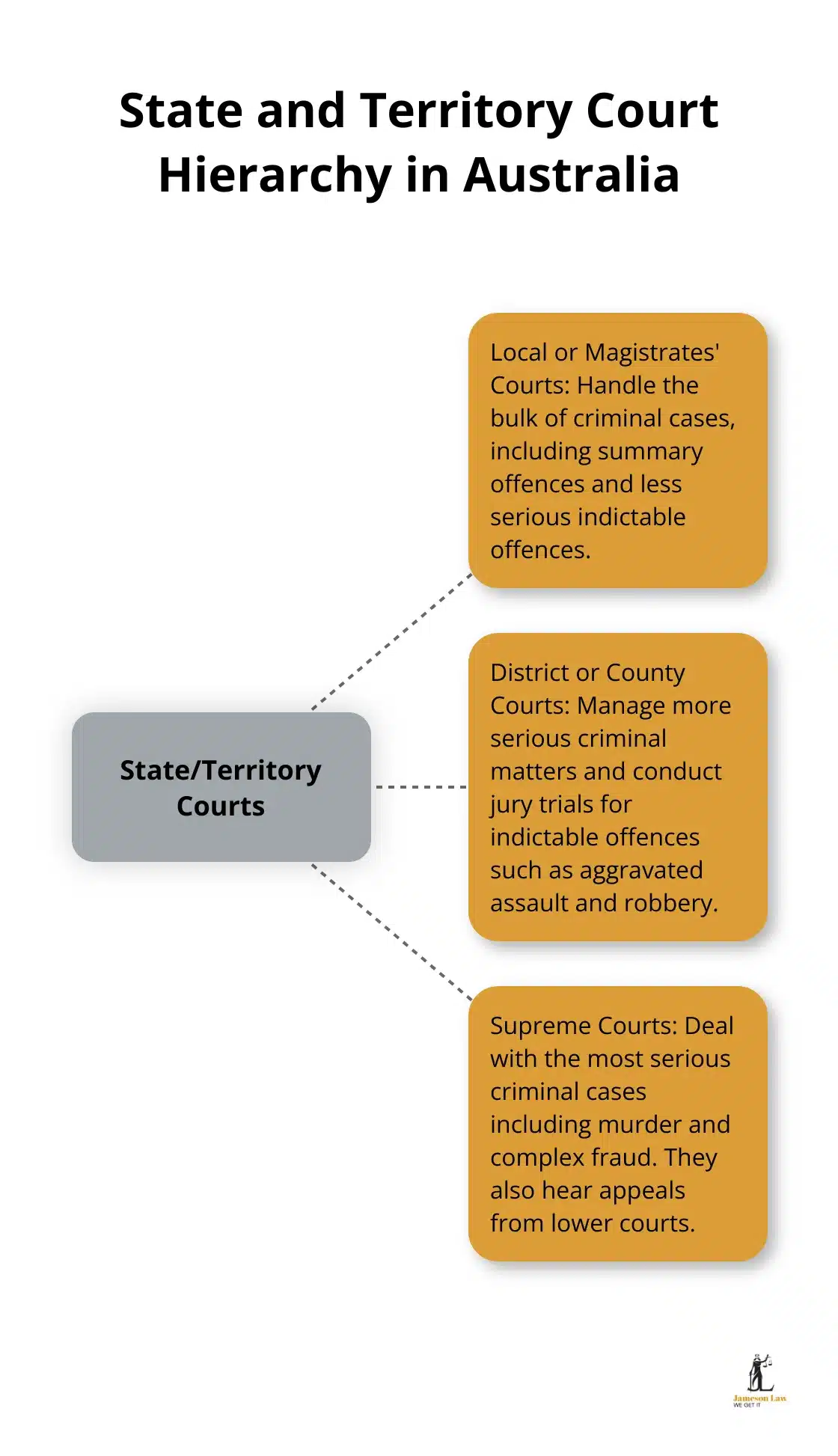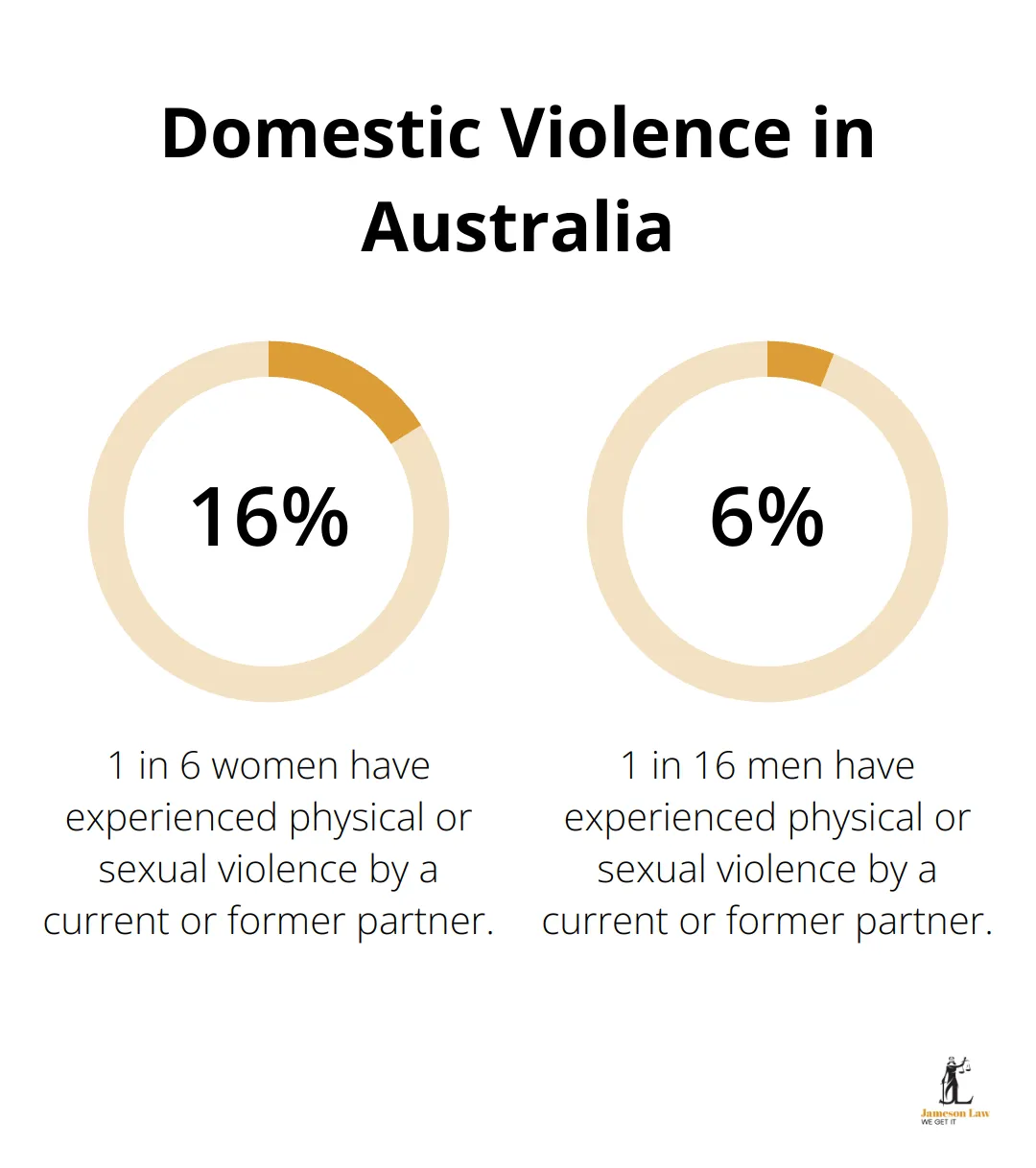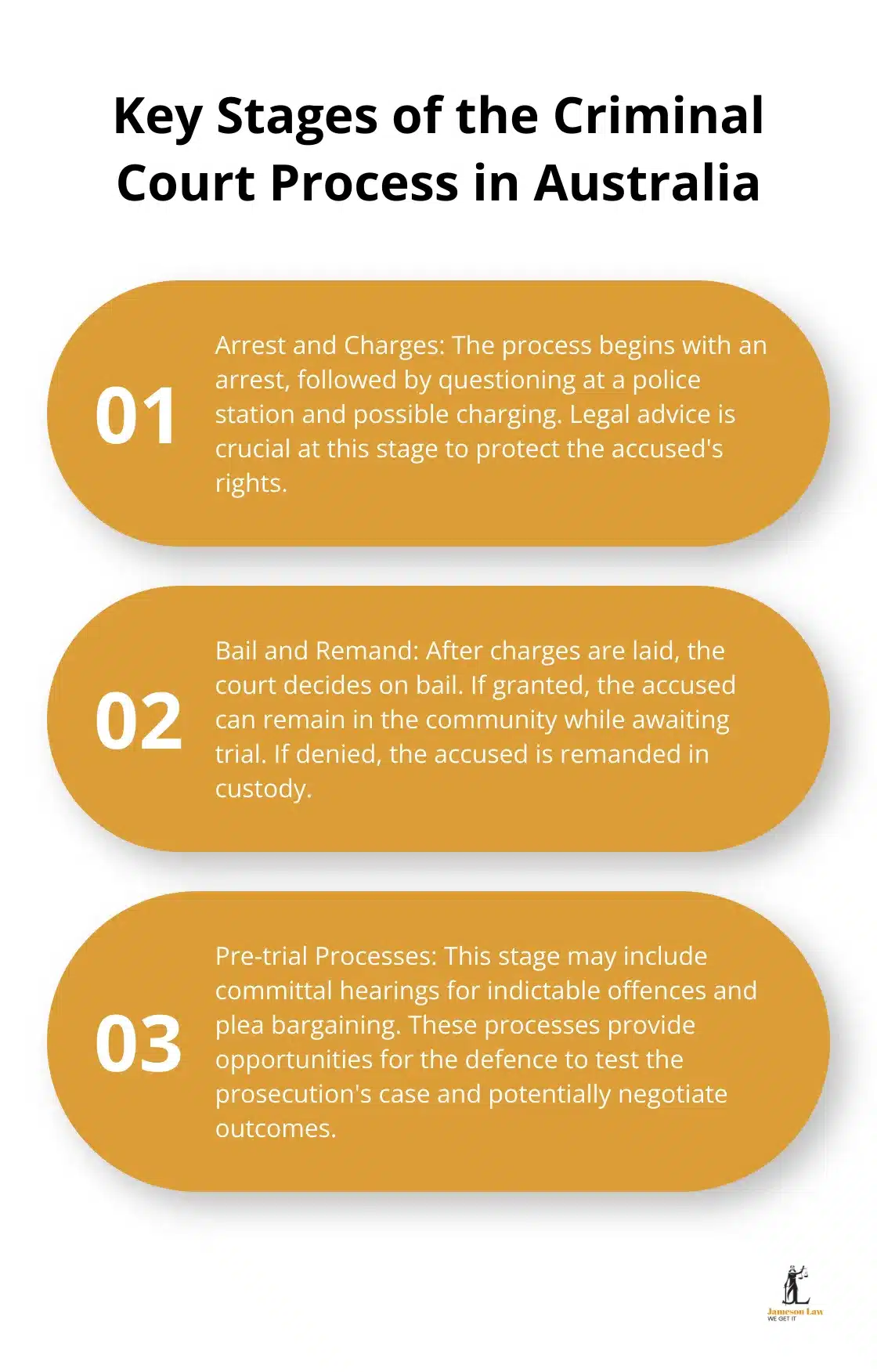The Australian criminal justice system is a complex network of courts, laws, and procedures. At Jameson Law, we often see clients grappling with the intricacies of criminal court cases in Australia.
This blog post will guide you through the Australian criminal court system, exploring different types of cases and the legal process. We’ll also highlight some high-profile cases that have shaped Australian law and discuss how understanding your rights can make a significant difference in court proceedings.
How Australia’s Criminal Court System Works
Federal Courts: The Apex of Justice
Australia’s criminal court system comprises a network of federal and state/territory courts. At the federal level, the High Court of Australia stands as the highest court in the land. It addresses constitutional matters and hears appeals from courts across all areas of law.
The Federal Court of Australia tackles criminal cases related to federal laws. These often involve serious crimes that cross state borders or impact national security (such as drug importations, terrorism, and certain fraud offences).
State and Territory Courts: The Backbone of Criminal Justice
Each state and territory operates its own court hierarchy:
- Local or Magistrates’ Courts: These courts handle the bulk of criminal cases in Australia. They preside over summary offences and less serious indictable offences.
- District or County Courts: These courts manage more serious criminal matters. They conduct jury trials for indictable offences (such as aggravated assault, robbery, and some drug offences).
- Supreme Courts: At the top of the state hierarchy, these courts deal with the most serious criminal cases (including murder, manslaughter, and complex fraud). They also hear appeals from lower courts.

Key Players in Criminal Court Cases
Several essential figures shape the outcome of criminal court cases:
- Judge or Magistrate: They preside over the court, ensure fair proceedings, and make decisions on legal matters.
- Jury (in applicable cases): They determine the facts of the case and decide on guilt or innocence.
- Prosecutors: They represent the state and present the case against the accused.
- Defence Lawyers: They advocate for the defendant, challenge evidence, and present arguments in their client’s favour.
- Witnesses: They provide crucial evidence to support either the prosecution or defence.
- Court Staff: Clerks and bailiffs ensure the smooth running of proceedings.
- Expert Witnesses (in some cases): They offer specialist knowledge on technical matters.
Understanding this system proves essential for anyone facing charges or interested in the legal process. The complexity of Australia’s criminal court system often necessitates professional legal advice when dealing with criminal matters.
As we move forward, let’s explore the various types of criminal cases that these courts handle and how they impact Australian law.
Types of Criminal Cases in Australian Courts
Summary v Indictable Offences
Australian courts handle a diverse range of criminal cases, from minor infractions to serious offences. The nature of the crime determines which court will hear the case and the potential penalties involved.
Criminal offences in Australia fall into two main categories: summary and indictable. Summary offences, typically less serious, are heard in Local or Magistrates’ Courts. These include minor assaults, traffic violations, and petty theft. Indictable offences, more serious crimes, are usually tried in higher courts, such as District or Supreme Courts.
Many indictable offences can be dealt with summarily if the accused consents and the magistrate deems it appropriate. This flexibility allows for more efficient case management and can benefit defendants (potentially resulting in lighter sentences).
Common Criminal Cases
Assault Cases
Assault cases rank among the most frequent criminal matters in Australian courts. 1 in 6 women have experienced physical or sexual violence by a current or former partner, while for men it is 1 in 16. These cases span from common assault to aggravated assault causing grievous bodily harm.

Drug Offences
Drug offences feature prominently in our court system. In 2019-2020, there was a major jump in billions of dollars worth of illicit drugs seized in Australia. These cases often involve possession, supply, or trafficking of illegal substances.
Theft and Related Offences
Theft and related offences constitute another common category. The ABS recorded 435,808 victims of theft in 2021. These cases range from shoplifting to large-scale fraud, with penalties varying accordingly.
High-Profile Cases and Their Legal Impact
High-profile criminal cases often shape Australian law and public perception. The 2020 High Court decision in Pell v The Queen led to close appellate scrutiny at a time when criminal justice systems in this country are struggling to strike the right balance. This case led to increased scrutiny of how courts assess evidence in sexual assault cases.
The 2019 NSW Court of Criminal Appeal decision in R v Lazarus sparked a national conversation about consent laws and led to legislative reforms in several states.
The ongoing prosecution of alleged war criminals (such as the case against Ben Roberts-Smith) has brought international humanitarian law into focus in Australian courts. These cases test the boundaries of our legal system in dealing with complex, historically significant matters.
High-profile cases influence legal strategies and outcomes for many clients. They often set precedents that affect how similar cases are handled in the future, making it essential for criminal lawyers to stay informed about these developments.
As we move forward, we will explore the intricate process of criminal court proceedings in Australia, from arrest to sentencing.
How the Criminal Court Process Works in Australia

Arrest and Charges
The criminal court process in Australia starts with an arrest. Police must have reasonable grounds to suspect a person has committed an offence. After the arrest, officers take the accused to a police station for questioning and possible charging.
At this stage, legal advice becomes critical. A lawyer can guide the accused through police questioning and protect their rights. Many legal experts advise clients to exercise their right to silence until they receive proper legal counsel.
Bail and Remand
Once charges are laid, the question of bail arises. Bail allows an accused person to remain in the community while awaiting trial.
If a court denies bail, the accused is remanded in Custody. This decision depends on factors like the seriousness of the offence, the strength of the prosecution’s case, and the accused’s criminal history. A skilled lawyer can make a significant difference in bail applications by presenting compelling arguments for release.
Pre-trial Processes
Before a trial, several important processes occur. For indictable offences, a court may hold a committal hearing to determine if there’s enough evidence for a trial. This hearing provides a crucial opportunity for the defence to test the prosecution’s case.
Plea bargaining is another key pre-trial process. This high rate underscores the importance of skilled negotiation in criminal defence.
The Trial
If a case proceeds to trial, the process can take considerable time. Court delays in the Local Court remain substantially longer than prior to the pandemic.
During the trial, both prosecution and defence present their cases, call witnesses, and make arguments. For jury trials (common for serious indictable offences), the jury’s role in determining guilt is paramount.
If the court finds the defendant guilty, sentencing follows. Judges consider various factors including the nature of the offence, the offender’s circumstances, and any mitigating factors.
Each stage of this process presents opportunities and challenges that can significantly impact the outcome of a case. That’s why experienced legal representation throughout this journey is not just beneficial – it’s essential.
Final Thoughts
The Australian criminal court system presents unique challenges at every stage. From arrest to verdict, each step requires careful navigation and understanding. Criminal court cases in Australia encompass a wide range of offences, handled by various courts at federal and state levels.
Your rights and knowledge of legal procedures can significantly impact your case outcome. Decisions made during police questioning, bail applications, and pre-trial processes can shape the direction of your case. High-profile cases often influence legal precedents and sometimes lead to legislative reforms.
At Jameson Law, we guide clients through the complexities of the criminal justice process. Our team provides expert advice and skilled representation to achieve the best possible outcomes. Professional legal assistance can make a substantial difference in your journey through the Australian criminal court system.













